Are Peace Lilies Toxic To Cats? What You Need To Know
Your peace lily and cats aren’t a perfect combination, but these plants are not necessarily deadly for cats. If your cat eats a peace lily it will cause irritation but probably won't prove fatal.
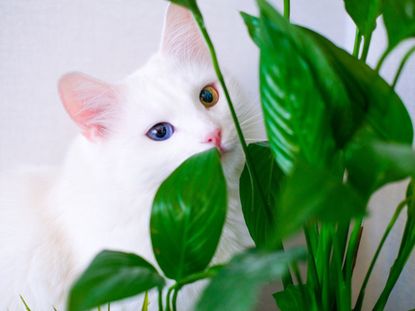

Peace Lily Toxicity in Cats - Is Your Cat Safe?
An important question for many houseplant parents is whether their peace lily is toxic to cats. The short answer is yes, but there’s more to the story. Attractive and easy to care for, peace lilies are popular houseplants. But do your peace lily and cat belong in the same house?
Is Peace Lily Poisonous to Cats?
If you have a peace lily, your cat shouldn’t be allowed to eat it, but there is much more of a danger with true lilies. The peace lily belongs to the Araceae family and Spathyphyllum genus of tropical plants, but true lilies belong to the Liliaceae family and lilium genus, and those are the ones you definitely want to separate from your beloved pets.
True lilies are highly toxic to cats. Some examples of lilies commonly used in gardens or as houseplants or cut flowers include Easter, Asiatic, Stargazer, and Tiger lilies. They are the ones that contain compounds that affect a cat’s kidneys. Even consuming a very small amount can be fatal to a cat by causing acute kidney failure.
Cats and Peace Lily Toxicity
Considered mildly to moderately toxic, peace lilies are much less toxic than true lilies and are unlikely to cause fatalities in cats. However, peace lilies contain a substance called calcium oxalate, which are insoluble crystals. A cat chewing on a peace lily releases the calcium oxalate crystals, which will penetrate tissues and cause discomfort, irritating the mouth and gastrointestinal tracts of cats. Peace lilies should certainly not be available to them in the areas where they commonly play and eat.
Common Symptoms
The act of chewing on the leaves releases crystals immediately, so most cats show signs of irritation right away. Typical symptoms of peace lily poisoning include:
- Oral pain and irritation
- Drooling
- Pawing at the mouth
- Vomiting
- Difficulty swallowing
- Decreased irritation
In very rare cases calcium oxalate crystals cause swelling in the upper airway. This can make it difficult for the cat to breathe, so even though the peace lily is less toxic than a true lily, it can certainly cause problems and discomfort for curious felines.
What to Do if Your Cat Eats a Peace Lily
Most cats will be fine after the irritation passes. You can help your cat feel better by removing any plant matter remaining in their mouth. Wipe down their paws if they’ve touched the chewed plant. Although your cat is most likely ok, it’s a good idea to call your veterinarian. If your cat seems to be struggling to breathe, contact your vet immediately or go to an emergency vet.
Gardening tips, videos, info and more delivered right to your inbox!
Sign up for the Gardening Know How newsletter today and receive a free download of our most popular eBook "How to Grow Delicious Tomatoes."
How to Protect Your Cat from Peace Lilies
Because peace lilies are not fatally toxic, cat owners might be alright with having them in the house. Since it causes instant irritation, most cats will stop chewing a peace lily right away, making it unlikely they will ingest very much of the plant.
Still, it’s best to take some precautions if you have a peace lily and cats. If there is a room or an area of the house your cat doesn’t go, consider keeping the peace lily there. You can also make it distasteful to your cat by spraying the leaves with diluted lemon juice or a specially made deterrent spray from the pet store.
Another good strategy is to provide your cat with plants that are safe to chew. Try cat grass, mint, or catnip. If your cat tries to chew on a peace lily, redirect them to one of these safer alternatives or choose plants that cats avoid.
Peace lilies are considered only moderately toxic, but to be completely safe, it’s best not to have them in a home with cats. They are similarly toxic for dogs. Choose pet-safe plants to enjoy houseplants and to protect your furry friends.

Mary Ellen Ellis has been gardening for over 20 years. With degrees in Chemistry and Biology, Mary Ellen's specialties are flowers, native plants, and herbs.
- Caroline BloomfieldManager of Marketing Communications
-
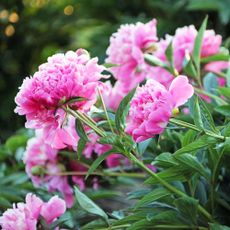 How To Keep Peonies From Falling Over: 5 Fixes For Floppy Flowers
How To Keep Peonies From Falling Over: 5 Fixes For Floppy FlowersPeonies are cottage garden favorites, but they can be prone to flopping. Support peonies with these practical ideas that can double as attractive features.
By Melanie Griffiths
-
 9 Bird-Friendly Flowering Plants: Flowers That Attract Birds Through The Seasons
9 Bird-Friendly Flowering Plants: Flowers That Attract Birds Through The SeasonsChoose the right flowering plants and your garden will become a favorite hangout for avian visitors. Try these nine flowers that attract birds to your yard
By Tonya Barnett
-
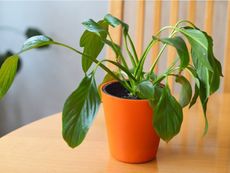 How To Revive A Peace Lily Drooping After Repotting
How To Revive A Peace Lily Drooping After RepottingLearn how to repot and revive a droopy peace lily when it needs a new home.
By Susan Albert
-
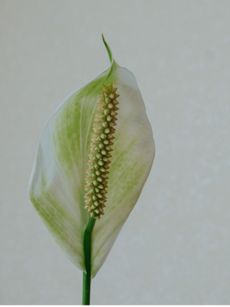 Peace Lily Flowers Are Green – Fixing Green Blooms On Peace Lilies
Peace Lily Flowers Are Green – Fixing Green Blooms On Peace LiliesPeace lilies produce gorgeous white flowers. But if your flowers are green, the contrast is not as striking. Learn about this phenomenon here.
By Mary Ellen Ellis
-
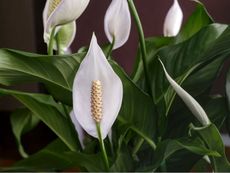 Diseases In Spathiphyllum: Tips On Treating Peace Lily Diseases
Diseases In Spathiphyllum: Tips On Treating Peace Lily DiseasesPeace lilies are tough and resilient, but they are susceptible to a few pests and diseases. This article provides more information about peace lily plant problems, including common diseases in Spathiphyllum plants.
By Teo Spengler
-
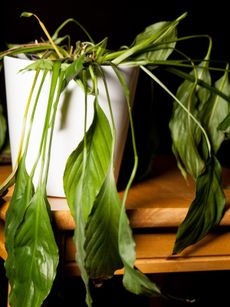 Drooping Peace Lily: How To Revive A Wilting Spathiphyllum
Drooping Peace Lily: How To Revive A Wilting SpathiphyllumA drooping peace lily is a common occurrence and can indicate several different issues, most of which can be corrected.
By Tonya Barnett
-
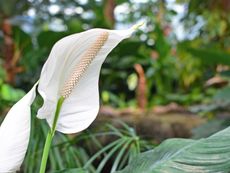 Do Peace Lilies Need Fertilizer – When To Feed Peace Lily Plants
Do Peace Lilies Need Fertilizer – When To Feed Peace Lily PlantsDo peace lilies need fertilizer? Believe it or not, many folks prefer to skip the fertilizer and their peace lily plants do just fine without it. However, fertilizing a peace lily now and then is important to encourage blooming. Learn more in this article.
By Mary H. Dyer
-
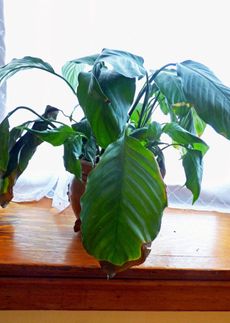 Peace Lily With Brown Tips: Common Causes & How To Fix Them
Peace Lily With Brown Tips: Common Causes & How To Fix ThemA common complaint about peace lily tips turning brown is an easy fix if you know what’s causing it. Make it happy by adjusting your care.
By Teo Spengler
-
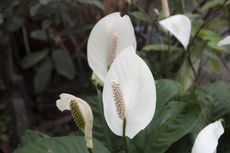 Peace Lily And Pollution – Do Peace Lilies Help With Air Quality
Peace Lily And Pollution – Do Peace Lilies Help With Air QualityThere are many plants that thrive indoors in low light and actively remove pollutants from the air. Way at the top of that list of plants is the peace lily. Learn more about using peace lily plants for air purification.
By Liz Baessler
-
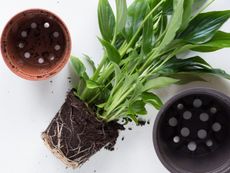 Peace Lily Repotting – Learn How And When To Repot Peace Lilies
Peace Lily Repotting – Learn How And When To Repot Peace LiliesRepotting a peace lily plant is occasionally necessary, as a rootbound plant isn't able to absorb nutrients and water and may eventually die. Fortunately, peace lily repotting is easy! Learn how to repot a peace lily in this article.
By Mary H. Dyer